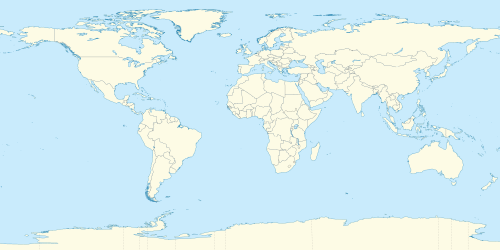The Globalization and World Cities Research Network (GaWC) is a think tank that studies the relationships between world cities in the context of globalization. It is based in the geography department of Loughborough University in Leicestershire, United Kingdom. GaWC was founded by Peter J. Taylor in 1998.[2] Together with Jon Beaverstock and Richard G. Smith, they create the GaWC's biennial categorization of world cities into "Alpha", "Beta" and "Gamma" tiers, based upon their international connectedness.[3]
 | |
| Established | 1998 |
|---|---|
| Director | Peter J. Taylor |
| Location | Loughborough, United Kingdom |
| Website | lboro.ac.uk/gawc |
GaWC city classification edit
The GaWC examines cities worldwide to narrow them down to a roster of world cities, then ranks these based on their connectivity through four "advanced producer services": accountancy, advertising, banking/finance, and law.[4] The GaWC inventory ranks city economics more heavily than political or cultural factors. Beyond the categories of "Alpha" world cities (with four sub-categories), "Beta" world cities (three sub-categories), and "Gamma" world cities (three sub-categories), the GaWC cities include additional cities at "High sufficiency" and "Sufficiency" level.
GaWC published city classifications in 1998, 2000, 2004, 2008, 2010, 2012, 2016, 2018, and 2020.[5] The 2004 rankings added several new indicators while continuing to rank city economics more heavily than political or cultural factors. The 2008 roster, similar to the 1998 version, is sorted into categories of Alpha world cities (with four sub-categories), Beta world cities (three sub-categories), Gamma world cities (three sub-categories), and additional cities with High sufficiency or Sufficiency presence. The list has been prone to change in the ranks. For example, some cities that were selected prior to 2018, such as the United States cities of Greensboro and Providence, are no longer classified as sufficient level.[6][7]
2022 city classification edit
The classification results for 2022 are derived from the activities of 175 leading firms providing advanced producer services across 802 cities worldwide. The results should be interpreted as indicating the importance of cities as nodes in the world city network (i.e. enabling corporate globalization).[8] The cities in the 2022 classification are as follows.[9]
( 1) or ( 1) indicates a city moved one category up or down since the 2020 classification.[10]
Alpha edit
Alpha level cities are linked to major economic states/regions and highly integrated into the world economy. Alpha level cities are classified into four sections: Alpha ++, Alpha +, Alpha, and Alpha − cities.
Alpha ++ edit
Alpha ++ cities are cities most integrated with the global economy:
Alpha + edit
Alpha + are "other highly integrated cities that complement London and New York, largely filling in advanced service needs for the Pacific/Asia [region]":[11]
Alpha edit
- Amsterdam
- Brussels
- Chicago
- Frankfurt
- Istanbul ( 1)
- Jakarta
- Kuala Lumpur
- Los Angeles
- Luxembourg ( 1)
- Madrid
- Mexico City
- Milan
- Mumbai
- São Paulo
- Seoul ( 1)
- Sydney
- Toronto
- Warsaw ( 1)
Alpha − edit
Beta edit
Beta level cities are cities that link moderate economic regions to the world economy and are classified into three sections, Beta +, Beta, and Beta − cities.
Beta + edit
Beta edit
Beta − edit
Gamma edit
Gamma level cities are cities that link smaller economic regions into the world economy and are classified into three sections, Gamma +, Gamma, and Gamma − cities.
Gamma + edit
- Accra ( 2)
- Amman ( 1)
- Antwerp
- Austin ( 1)
- Chennai ( 2)
- Dar es Salaam
- Detroit ( 1)
- Guatemala City ( 1)
- Kunming
- Lahore ( 1)
- Lyon ( 1)
- Manchester ( 1)
- Minneapolis ( 1)
- Monterrey ( 1)
- Muscat ( 1)
- Porto
- Pune
- Rotterdam
- Qingdao
- San Diego ( 1)
- San Juan ( 1)
- Santo Domingo ( 1)
- St. Louis
- Suzhou
- Valencia ( 1)
- Zhengzhou ( 1)
Gamma edit
Gamma − edit
Sufficiency edit
Sufficiency level cities are cities that have a sufficient degree of services so as not to be overly dependent on world cities. This is sorted into high sufficiency cities and sufficiency cities.
High sufficiency edit
- Abidjan
- Ahmedabad ( 3)
- Algiers ( 3)
- Ankara ( 2)
- Asunción ( 1)
- Baltimore ( 3)
- Belfast ( 3)
- Bilbao ( 1)
- Birmingham
- Changchun ( 1)
- Cleveland ( 1)
- Curitiba
- Dammam
- Durban ( 2)
- Guadalajara ( 3)
- Guayaquil ( 2)
- Harbin ( 1)
- Kansas City ( 1)
- Kolkata ( 3)
- La Paz ( 2)
- Limassol ( 1)
- Ljubljana ( 3)
- Luanda ( 1)
- Maputo ( 1)
- Marseille ( 1)
- Milwaukee ( 1)
- Moscow ( 8)
- Nanchang ( 1)
- Nashville ( 2)
- Nassau ( 1)
- Ningbo
- Penang ( 1)
- Phoenix ( 3)
- Pittsburgh ( 1)
- Querétaro ( 1)
- Tallinn ( 1)
- Tegucigalpa ( 2)
- Ürümqi ( 1)
- Wellington ( 2)
- Yangon
Sufficiency edit
- Aarhus
- Aberdeen
- Abuja ( 1)
- Aguascalientes City
- Alexandria
- Astana
- Bandar Seri Begawan
- Barranquilla
- Basel
- Belo Horizonte ( 2)
- Bergen
- Bern
- Bishkek
- Blantyre
- Bologna
- Bordeaux
- Brasília ( 1)
- Bremen
- Bursa
- Cali
- Campinas
- Canberra
- Cebu City
- Cincinnati ( 1)
- Ciudad Juárez
- Christchurch
- Columbus ( 2)
- Des Moines
- Dresden
- Edmonton ( 2)
- Essen
- Foshan[i]
- Fukuoka
- Gaborone
- George Town ( 5)
- Glasgow ( 4)
- Genoa
- Grenoble
- Guiyang
- Hamilton
- Halifax
- Hanover
- Hartford ( 1)
- Hohhot
- Indianapolis ( 1)
- İzmir
- Jacksonville
- Johor Bahru ( 1)
- Kabul
- Kaohsiung ( 2)
- Kathmandu[i]
- Katowice ( 2)
- Kigali
- Kingston
- Kochi
- Kraków ( 1)
- Labuan
- Lanzhou
- Las Vegas
- Lausanne ( 2)
- Leeds ( 1)
- Leipzig
- León
- Libreville
- Liège
- Lille
- Lilongwe[i]
- Linz
- Liverpool
- Łódź
- Louisville
- Málaga ( 2)
- Malmö ( 3)
- Mannheim
- Mérida
- Mexicali
- Nagoya ( 2)
- Nanning
- Nantes ( 3)
- Naples
- Newcastle upon Tyne
- Nice
- Nottingham
- Nuremberg
- Oklahoma City
- Ottawa ( 3)
- Orlando ( 4)
- Palo Alto
- Portland
- Port Louis ( 2)
- Port of Spain ( 1)
- Porto Alegre ( 1)
- Poznań ( 2)
- Pretoria
- Puebla ( 1)
- Quebec City
- Raleigh ( 1)
- Recife
- Reykjavík
- Richmond
- Sacramento ( 2)
- Salt Lake City ( 2)
- San Antonio ( 1)
- San Luis Potosí City
- Sanaa
- Santa Cruz de la Sierra
- Sarajevo
- Seville ( 1)
- Shijiazhuang
- Skopje
- Southampton
- Strasbourg ( 1)
- Surabaya
- Taichung ( 3)
- Tashkent
- The Hague ( 1)
- Tijuana ( 1)
- Toulouse
- Turin ( 3)
- Ulaanbaatar ( 1)
- Utrecht
- Valencia
- Vilnius ( 3)
- Windhoek
- Winnipeg
- Wrocław ( 3)
- Wuxi
- Yerevan ( 1)
- Zhuhai
No longer classified edit
The following cities were included in the 2020 edition, but not in the 2022 edition:
- Baghdad
- Birmingham
- Brazzaville
- Buffalo
- Busan
- Cardiff
- Chihuahua
- Chișinău
- Córdoba
- Dortmund
- Dushanbe
- Florence
- Goiânia
- Graz
- Haifa
- Harrisburg
- Hobart
- Honolulu
- Hsinchu
- Jerusalem
- Kazan
- Kinshasa
- Kobe
- Kyoto
- Lomé
- Macau
- Malacca
- Memphis
- Minsk
- Montpellier
- New Orleans
- Novosibirsk
- Omaha
- Palermo
- Podgorica
- Port Elizabeth
- Port Harcourt
- Port Moresby
- Rochester
- Rosario
- Saint Petersburg
- Salvador
- San Pedro Sula
- Sapporo
- Saskatoon
- Sendai
- Sheffield
- Suva
- Tainan
- Trieste
- Tulsa
- Valparaíso
- Vientiane
- Yokohama
See also edit
Notes edit
References edit
- ^ "GaWC - The World According to GaWC 2020". www.lboro.ac.uk. Retrieved 17 January 2023.
- ^ Taylor, Peter J. (2004). World city network: a global urban analysis. Routledge. p. ix. ISBN 0-415-30249-8. Retrieved 10 October 2010.
- ^ Donald, Stephanie; Gammack, John G. (2007). Tourism and the branded city. London: Ashgate Publishing. p. 23. ISBN 978-0-7546-4829-1. Archived from the original on 30 June 2023. Retrieved 10 October 2010.
- ^ "GaWC City Link Classification 2018". Lboro.ac.uk. 13 November 2018. Archived from the original on 29 March 2022. Retrieved 7 August 2019.
- ^ "The World According to GaWC". GaWC - Research Network. Archived from the original on 1 January 2023. Retrieved 20 December 2020.
- ^ "GaWC - The World According to GaWC 2010". www.lboro.ac.uk. Archived from the original on 16 May 2022. Retrieved 16 May 2022.
- ^ "GaWC - The World According to GaWC 2012". www.lboro.ac.uk. Archived from the original on 16 May 2022. Retrieved 16 May 2022.
- ^ "GaWC - The World According to GaWC 2020: Classification of Cities". www.lboro.ac.uk. Archived from the original on 29 March 2022. Retrieved 25 May 2022.
- ^ "The World According to GaWC 2022". Twitter. Globalization and World Cities. Retrieved 24 May 2022.
{{cite web}}: CS1 maint: url-status (link) - ^ "The World According to GaWC 2020". GaWC - Research Network. Globalization and World Cities. Archived from the original on 12 June 2022. Retrieved 26 August 2020.
- ^ "GaWC - The World According to GaWC". www.lboro.ac.uk. Archived from the original on 1 January 2023. Retrieved 25 May 2022.
